Related Research Articles
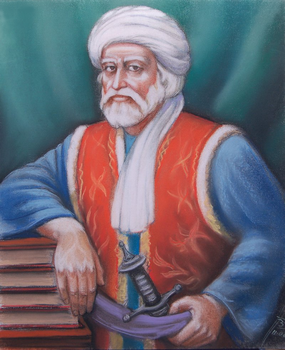
Khošāl Khān Khaṭak (Pashto: خوشال خان خټک; Urdu, Persian: خوشحال خان خٹک; 1613 – 20 February 1689), also known as Khushal Baba, was a 17th-century Pashtun poet, chief, and warrior. Khushal Khan served the Mughal Empire protecting them from Pashtun warriors over most of his lifespan. After being expelled from his tribal chiefdom and replaced with his son by his Mughal superiors, Khushal Khan turned against the Mughals. Afterwards, Khushal preached the union of all Pashtuns, and encouraged revolt against the Mughal Empire, promoting Pashtun nationalism in the last years of his life through poetry. Much of Khushal's poetry is in Pashto but some is also in Persian. Khushal is considered the "father of Pashto literature" and the national poet of Afghanistan.

Asrar-i-Khudi was the first philosophical poetry book of Allama Iqbal. This book deals mainly with the individual, while his second book Rumuz-i-Bekhudiرموزِ بیخودی discusses the interaction between the individual and society.

Akka Mahadevi was an early poet of Kannada literature and a prominent member of the Lingayatism founded in the 12th century. Her 430 vachanas, and the two short writings called Mantrogopya and the Yogangatrividh are considered her known contributions to Kannada literature. The term Akka was an honorific given to her by saints such as Basavanna, Siddharama, and Allamaprabhu as an indication of her high place in the spiritual discussions held at the "Anubhava Mantapa". She is regarded to be a major female figure in Kannada literature and in the history of Karnataka. She considered the god Shiva as her husband.
The qaṣīda is an ancient Arabic word and form of poetry, often translated as ode. The qasida originated in pre-Islamic Arabic poetry and passed into non-Arabic cultures after the Arab Muslim expansion.

The Call of the Marching Bell was the first Urdu philosophical poetry book by Muhammad Iqbal.

Zabur-i-Ajam is a philosophical poetry book, written in Persian, of Allama Iqbal, the great poet-philosopher of the Indian subcontinent. It was published in 1927.

Armaghan-i-Hijaz was a philosophical poetry book of Allama Iqbal, the great poet-philosopher of Islam.
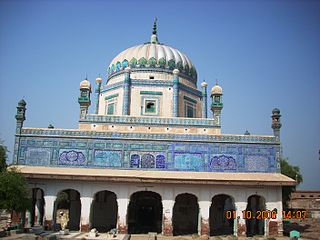
Makhdum Rashid, is a town of approximately 30,000 in Multan, Punjab, Pakistan.

Harindranath Chattopadhyay was an Indian English poet, dramatist, actor, musician and a member of the 1st Lok Sabha from Vijayawada constituency. He was the younger brother of Sarojini Naidu, the second woman President of the Indian National Congress and first Indian woman to hold the position, and Virendranath Chattopadhyay, an international communist revolutionary. The Government of India awarded him the civilian honour of the Padma Bhushan in 1973.
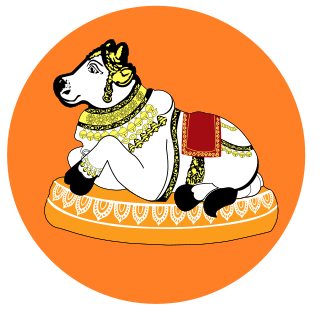
Allamaprabhu was a 12th-century mystic-saint and Vachana poet of the Kannada language, propagating the unitary consciousness of Self and Shiva. Allamaprabhu is one of the celebrated poets and the patron saint of the Lingayata movement that reshaped medieval Karnataka society and popular Kannada literature. He is included among the "Trinity of Lingayathism", along with Basavanna, the founder of the movement, and Akka Mahadevi, the most prominent woman poet.
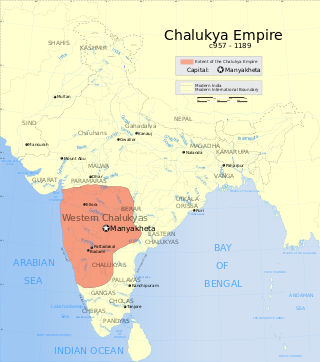
A large body of Western Chalukya literature in the Kannada language was produced during the reign of the Western Chalukya Empire in what is now southern India. This dynasty, which ruled most of the western Deccan in South India, is sometimes called the Kalyani Chalukya dynasty after its royal capital at Kalyani, and sometimes called the Later Chalukya dynasty for its theoretical relationship to the 6th-century Chalukya dynasty of Badami. For a brief period (1162–1183), the Kalachuris of Kalyani, a dynasty of kings who had earlier migrated to the Karnataka region from central India and served as vassals for several generations, exploited the growing weakness of their overlords and annexed the Kalyani. Around 1183, the last Chalukya scion, Someshvara IV, overthrew the Kalachuris to regain control of the royal city. But his efforts were in vain, as other prominent Chalukya vassals in the Deccan, the Hoysalas, the Kakatiyas and the Seunas destroyed the remnants of the Chalukya power.

Self-enquiry, also spelled self-inquiry, is the constant attention to the inner awareness of "I" or "I am" recommended by Ramana Maharshi as the most efficient and direct way of discovering the unreality of the "I"-thought.
Allah Baksh Sarshar 'Uqaili was a Sufi poet from the Sindh province of Pakistan.

Rumuz-e-Bekhudi was the second philosophical poetry book of Allama Iqbal, a poet-philosopher of the Indian subcontinent. This is a sequel to his first book Asrar-e-Khudiاسرارِ خودی.
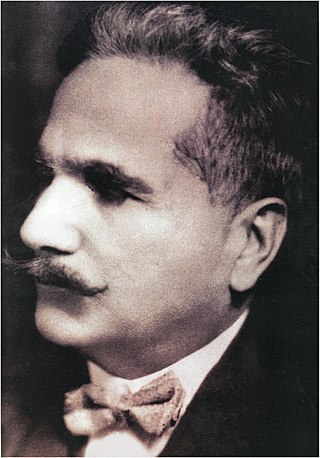
Sir Muhammad Iqbal was a South Asian Islamic philosopher, poet and politician. His poetry is considered to be among the greatest of the 20th century, and his vision of a cultural and political ideal for the Muslims of British-ruled India is widely regarded as having animated the impulse for the Pakistan Movement. He is commonly referred to by the honourific Allama and widely considered one of the most important and influential Muslim thinkers and Western religious philosophers of the 20th century.

Iqbal Academy Pakistan(Urdu:اقبال اکادمی پاکستان) is an institute whose purpose is to study, promote, and disseminate the teachings of the poet and philosopher Allama Muhammad Iqbal. It was established by the Government of Pakistan, through the Iqbal Academy Ordinance No. XXVI of 1962.
The Prabhu Linga Leelai Venpaas in Tamil written by Siva Prakasar also called as 'Siva anuputhi selvar, 'Karpanai Kalangiyam', 'Thurai mangalam Sivaprakasar'. He compiled more than thirty original works and few more translation works from Kannada and Sanskrit.

David Godman has written on the life, teachings and disciples of Ramana Maharshi, an Indian sage who lived and taught for more than fifty years at Arunachala, a sacred mountain in Tamil Nadu, India. In the last 30 years Godman has written or edited 16 books on topics related to Sri Ramana, his teachings and his followers.

Ramya Ramana is an American poet based in New York City. Ramana is a winner of the Youth Poet Laureate of New York City award. In 2015, Ramana was invited to participate in a local event in Guyana hosted by One Billion Rising a domestic violence awareness organization.
References
- ↑ Ettana Allama Ettana Ramana by Prasanna Santhekadur https://www.prajavani.net/district/mysore/book-release-646303.html